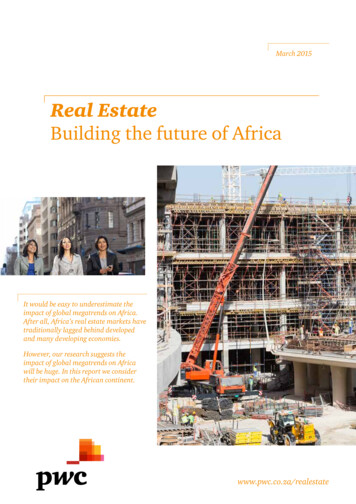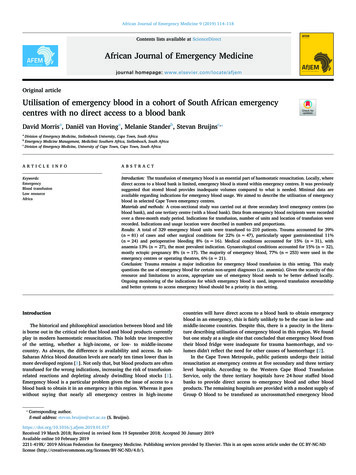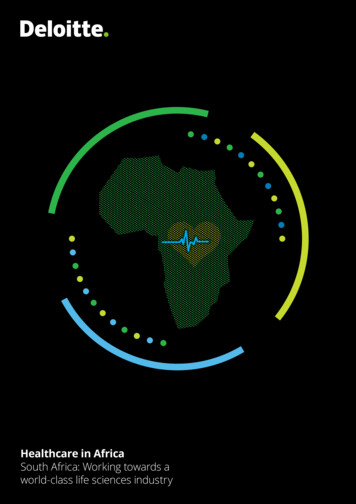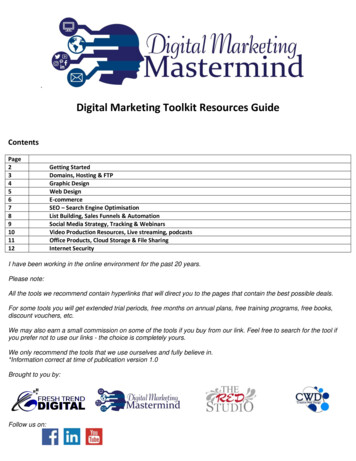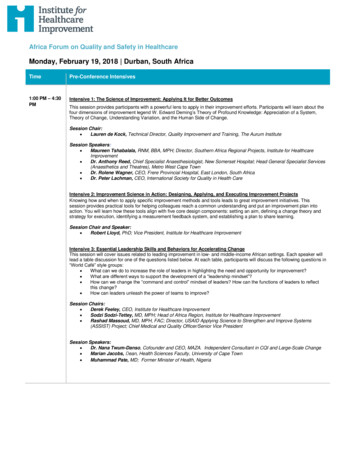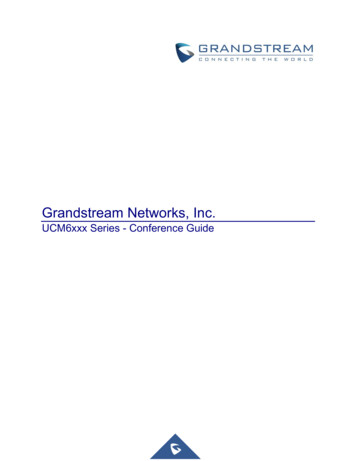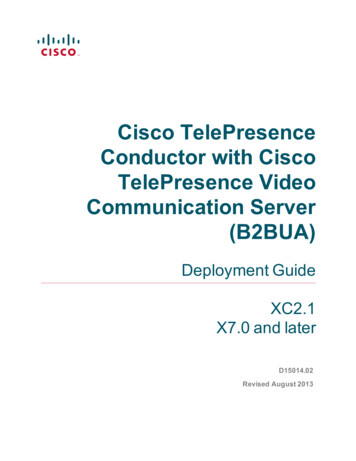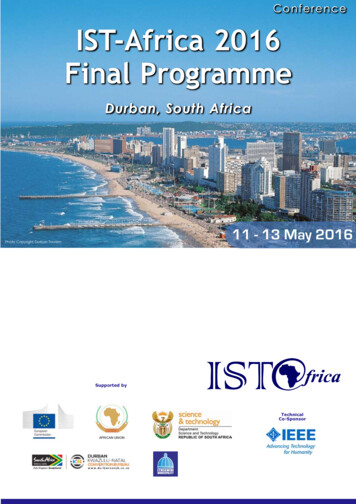
Transcription
C o n f erenceIST-Africa 2016Final ProgrammeDurban, South Africa11 - 13 May 2016Photo Copyright Durban TourismSupported byTechnicalCo-SponsorAFRICAN UNION
IntroductionIST-Africa 2016 Conference takes place 11 - 13 May 2016 in Durban, as part of IST-Africa Week2016. An activity of IST-Africa, which is supported by the European Commission and African UnionCommission, IST-Africa 2016 is the eleventh in an Annual Conference Series bringing together seniorrepresentatives from leading public, private, education & research organisations, to discuss ICT policy,showcase research results and share knowledge.European research activities are structured around consecutive multi-annual programmes, or so-calledFramework Programmes. Horizon 2020 sets out the Priorities and thematic areas, including ICT, for 2014 2020. Horizon 2020 is fully open to international co-operation with the aim to jointly address major challengeswhere significant added value is expected to be gained from a world-wide R&D cooperation. In this context,the European Commission has co-funded IST-Africa since 2006, to promote African - European researchcooperation and support Information Society and ICT aspects of the Africa-EU Strategic Partnership.Supported by the European Commission, African Union Commission, Department of Science and Technology SouthAfrica, Durban Kwazulu-Natal Convention Bureau, eThekwini Municipality and Technically Co-Sponsored by IEEE,IST-Africa 2016 focuses on the Role of ICT for Africa's Development and specifically on Applied ICT research inthe areas of eHealth, Technology Enhanced Learning and ICT Skills, Digital Libraries, eInfrastructures, eAgriculture,Societal Implications of Technology, International Cooperation, ICT4D and eGovernment. IST-Africa 2016 willprovide a collegiate setting for presentations and discussions of national & regional developments, issues of concern& good practice models, and networking with peers. IST-Africa 2016 will also provide an opportunity to identifypotential partners for future proposals under Horizon 2020.IST-Africa directly supports Information Society, Innovation and ICT aspects of the Africa-EU Strategic Partnership,the African Ministerial Council on Science and Technology (AMCOST) and the Consolidated Plan of Action for theAfrican Regional Action Plan on the Knowledge Economy (ARAPKE).The goals of the IST-Africa Conference Series are Community Building to facilitate EU-African researchcooperation and successful exploitation of research results, to stimulate take-up of RTD results by industry andthe public sector, to promote knowledge sharing between commercial, government and research organisations,to exchange experiences about the current state of eAdoption at a sectoral, national or regional level, and tosupport International Cooperation and open up the European Research Area (ERA) to Africa.The ProgrammeWho will you meet?IST-Africa 2016 Conference attracts policymakers, practitioners, and researchers from leadingcommercial, government and research organisationsaround the world. Unlike many research conferences,IST-Africa provides an opportunity to meet withsenior managers, practitioners, project managers,software engineers and researchers from industry,government and research organisations. Delegatesand speakers attend to share knowledge, experienceand lessons learnt, and network with their peers fromaround the world.The 3-day programme features an invigorating mixof business and government case studies, technicaland policy papers and interactive workshops. As wellas opening and closing plenary sessions, delegatesmay participate in 42 thematically focused parallelsessions featuring different aspects of InternationalCooperation, ICT4D, eHealth, eInfrastructures,Technology Enhanced Learning and ICT Skills,Digital Libraries, Mobile Applications, ICT forEnvironmental Sustainability and eAgriculture, CyberSecurity, Societal Implications of Technology andeGovernment. Session Chairs will ensure activediscussion and facilitate delegate participation.IST-Africa 2016 Conference also providesthe unique opportunity to identify partners andopportunities to co-operate in international ICTresearch projects co-funded by the EuropeanCommission under Horizon 2020. Much of theEuropean research results presented in this year'sconference were co-funded under the EuropeanCommission ICT Programme (FP7/Horizon 2020).The Opening Plenary on Wednesday 11 May featuresa high level dialogue on Open Innovation, ICTEntrepreneurship and Social Innovation in Africa.The Closing Plenary on Friday 13 May focuses onInternational Partnership Building.The programme is subject to change and the ISTAfrica 2016 Organising Committee reserves theright to alter the contents, venue and/or speakers.This Programme is accurate as at 29 April '16.The VenueIST-Africa 2016 Conference takes place in theSouthern Sun Elangeni Hotel, 63 Snell Parade (alongthe beachfront), Durban, which is 30 - 40 minutesdrive from the airport.[2-3]Final
ConferenceNetworkingNetworking is a key feature of the IST-AfricaConference Series. Paper and workshop sessionsare designed to maximise knowledge sharing byproviding time for interactive discussions during theconference programme itself. Coffee breaks andlunch facilitate informal one-on-one and small groupdiscussions following paper or workshop sessions.The Delegate Showcase on the Conference Portalallows registered delegates, speakers and exhibitorsto publish their own short profile and researchinterests to facilitate networking before, during andafter the conference. Leverage this functionality tocontact potential partners in advance and arrange tomeet during the conference.Open Innovation, ICT and SocialEntrepreneurship in Africa Workshop,10 MayThe IST-Africa Workshop on Open Innovation,ICT and Social Entrepreneurship in Africa on 10May will provide a forum to discuss and shareperspectives on the current level of CollaborativeOpen Innovation and ICT-based Entrepreneurshipand Social Entrepreneurship in Africa.The objectives of this interactive workshop are to (a)identify the needs of ICT Entrepreneurs and SocialEntrepreneurs in different African contexts, (b) identifyopportunities to strengthen support currently providedby Innovation Spaces, the education and researchsector and public sector agencies responsible forpromoting innovation and entrepreneurship and(c) inform the development of a coordinated multistakeholder approach to promoting and supportingOpen Innovation, ICT Entrepreneurship and SocialEntrepreneurship.Participants will have the opportunity to shareinsight, identify potential collaborators and contributeto a longitudinal study being undertaken as partof the activities of IST-Africa. Outputs from thisworkshop will be used to inform research, policy andpublicationsConference ProceedingsThe IST-Africa 2016 conference proceedingswill be provided to delegates on a USB drive andpublished on an open access basis in the PaperRepository on the Conference Portal. Following theconference, registered delegates will have access toall PowerPoint presentations, which will be publishedon the Conference Portal.Papers that are physically presented during theevent will also have the option after the event fortheir paper to be included in the IST-Africa 2016Conference Proceedings submitted for publication inIEEE Xplore.access to the facilities on offer. It is still necessaryto take care of bags, personal computers and otherpersonal belongings.The organisers cannot accept any responsibility forlosses incurred or for personal health and safety.Delegates should ensure that they have personalhealth insurance and take due care when exploringLilongwe. Any special needs or requirements shouldbe notified to the Conference Secretariat as far inadvance of the event as possible.Hotel AccommodationDelegates can book accommodation in the SouthernSun Elangeni Hotel (conference hotel) and GardenCourt Marine Parade at discounted rates throughonline registration for IST-Africa 2016, based onpayment in advance.Delegates are strongly recommended to book theiraccommodation early as it will be allocated on afirst-paid basis. Hotel accommodation can only beconfirmed upon receipt of the associated payment.For further information, please visit:www.IST-Africa.org/Conference2016How to get thereDurban is the capital of the Province of KwaZuluNatal, located on the east coast of South Africa.Durban has a population of c.3 million people andhas one of the busiest ports in Africa. Durban is onehour by air from Johannesburg with frequent flightschedules.The airport is situated 30 - 40 minutes drive fromSouthern Sun Elangeni Hotel.While in Durban, delegates and accompanyingpersons should visit the ‘Golden Mile’ (beachfrontarea), uShaka Marine World, City Hall and BotanicalGardens. Other places in interest around Durbaninclude: Hluhluwe-Imfolozi Game Reserve,Drakensberg Mountains, the Giant’s Castle WorldHeritage Site and the Valley of 1000 Hills.Support OrganisationsIST-Africa 2016 offers a variety of SponsorshipOpportunities to enhance your organisation’s image& standing with the international IST researchcommunity.IST-Africa 2016 is supported by the Departmentof Science and Technology, South Africa, DurbanKwaZulu-Natal Convention Bureau and eThekwiniMunicipality.For further information in relation to providingsupport, please contact the Conference Secretariatat secretariat@IST-Africa.orgSecurity, Health and SafetyPPlease wear your name badge for all IST-Africaactivities, as it is your identification and allows yourogramme11 - 13 May 2016
Plenary Session SpeakersH.E. Naledi PandorMinister of Science andTechnology, South AfricaPhil MjwaraDirector-General, Departmentof Science and Technology,South AfricaH.E. Hlengiwe BuhleMkhizeDeputy Minister DTPS,South AfricaDr Setumo MohapiCEO, State InformationTechnology Agency,South AfricaDaan du ToitDeputy Director-General,International Cooperation andResources, DST, South AfricaImraan PatelDeputy Director-Generalresponsible for ICT, DST,South AfricaMr Morten MøllerSenior Advisor to EuropeanCommissionDr Pascal HobaCEOUbuntuNet AllianceBarlow ManilalCEO, Technology InnovationAgency, South AfricaWarren HeroChief Technology Officer,Microsoft South AfricaProf. Darelle VanGreunenNelson Mandela MetropolitanUniversity, South AfricaMpho MatsitseIndustry Value Advisor,Information TechnologyAssociation of South AfricaPlenary Speakers as at 06 May 2016 include: H.E. Naledi Pandor, Minister of Science and Technology, South Africa Phil Mjwara, Director-General, Department of Science and Technology, South Africa H.E. Hlengiwe Buhle Mkhize, Deputy Minister Telecommunication and Postal Services, South Africa Dr Setumo Mohapi, CEO, State Information Technology Agency, South Africa Daan du Toit, Deputy Director-General, International Cooperation and Resources, Department of Science and Technology,South Africa Imraan Patel, Deputy Director-General responsible for ICT, Department of Science and Technology, South Africa Morten Moller, Senior Advisor to European Commission, Belgium Anneline Morgan, Senior Technical Advisor, Southern African Development Community, Botswana Imraan Patel, Deputy Director-General responsible for ICT, Department of Science and Technology, South Africa Dr Setumo Mohapi, CEO, State Information Technology Agency (SITA), South Africa Dr Pascal Hoba, CEO, UbuntuNet Alliance, Malawi Barlow Manilal, CEO, Technology Innovation Agency (TIA), South Africa Warren Hero, Chief Technology Officer, Microsoft South Africa Dr Gansen Pillay, Deputy CEO, National Research Foundation, South Africa Stephane Hogan, Science Counsellor at the EU Delegation to the African Union, Ethiopia Prof. Darelle van Greunen, School of ICT, Nelson Mandela Metropolitan University, South Africa Prof. Maurice Mars, Department of TeleHealth, University of Kwazulu-Natal, South Africa Mr Mpho Matsitse, Industry Value Advisor, Information Technology Association of South Africa Martin Weiss, Senior Technical Officer, MRC-PATH Global Health Innovation Accelerator, South Africa Tsietsi Maleho, General Manager: Monitoring, Evaluation & Partnerships, The Innovation Hub, South AfricaInternational Programme CommitteeOrganising CommitteeA distinguished Programme Committee has been formedto review and provide feedback on papers and presentations, and chair sessions.The IST-Africa 2016 International Programme Committeeincludes Miriam Cunningham, IIMC, Ireland Paul Cunningham, IIMC, Ireland Francois Davel, Department of Science and Technology,South Africa Paul Cunningham (Conference Chair), IIMC International InformationManagement Corporation Ltd, Ireland Tiwonge Msulira Banda, Ubuntunet Alliance, Malawi Laurens Cloete, Meraka Institute, CSIR, South Africa Miriam Cunningham, IIMC International Information ManagementCorporation Ltd, Ireland Kim Davis, Research Council of Norway, Norway Prof. Love Ekenberg, DSV, University of Stockholm, Sweden Dr. Charmayne Hughes, Health Equity Institute, San Francisco StateUniversity, USA Dr. Mike Joy, University of Warwick, United Kingdom Dr. Chipo Kanjo, Department of Computer Science, ChancellorCollege, University of Malawi, Malawi Emmanuel Kweyu, @iLabAfrica, University of Strathmore, Kenya Vasilis Koulolias, eGovLab, Stockholm University, Sweden Kristiina Lahde, 4Front, Finland Dr. Sirkku Männikkö Barbuti, DSV, Stockholm University, Sweden Dr. Johann Marquez-Barja, Trinity College Dublin, Ireland Prof. Maurice Mars, University of KwaZulu-Natal, South Africa Richard Stevens, Stevens Consultants, Italy Dr. Binyam Tilahun, University of Gondar, Ethiopia Dr Marita Turpin, Department of Informatics, University of Pretoria,South Africa Prof. Darelle Van Greunen, NMMU, South Africa[4-5]FinaConference SecretariatIIMC Ltd13 Docklands Innovation Park, 128 East Wall Road,Dublin 3, IrelandTel: 353 (0) 1 8170607, Fax: 353 (0) 1 8170606e-mail: rence2016l
ConferenceWednesday,May 11, 2016Othoman Elaswad, Technical university of Denmark, DenmarkA Framework for the Monitoring and Evaluation of e-GovernanceProjects in Developing CountriesSylvester Hatsu, School of Computing, University of South African/Accra Polytechnic, GhanaE-government Development in Sub-Saharan Africa (SSA):Relationship with Macro Level Indices and Possible ImplicationsSilas Formunyuy Verkijika, University of the Free State, South AfricaICT Readiness for Business Continuity in Local GovernmentRuan Koen, Nelson Mandela Metropolitan University, South Africa14:00 Session 3c: Technology-enhanced Learning I08:00Registration09:00 Opening Plenary 1a: Opening PlenaryOpening RemarksDaan du Toit, Deputy Director-General, International Cooperation andResources, Department of Science and Technology, South AfricaEU Africa CooperationMorten Møller, Senior Advisor to European Commission, BelgiumAfrican Union Commission AddressPresenter to be confirmedSADC AddressAnneline Morgan, Senior Technical Advisor, Southern AfricanDevelopment Community, BotswanaSpeech from DTPSH.E. Hlengiwe Buhle Mkhize, Deputy Minister, Department ofTelecommunications & Postal Services, South AfricaOfficial Opening SpeechPhil Mjwara, Director-General, Department of Science and Technology,South Africa10:30Coffee Break11:00 Plenary Session 2a: High-level Roundtable on Open Innovation,ICT Entrepreneurship and Social Innovation in AfricaModerator: Paul Cunningham, IIMC, IrelandPanelists confirmed to date include:Mr Imraan Patel, DST Deputy Director General responsible for ICT,Department of Science and Technology, South AfricaDr Gansen Pillay, Deputy Chief Executive Officer: Research andInnovation Support and Advancement, National Research Foundation,South AfricaDr Pascal Hoba, CEO, UbuntuNet AllianceWarren Hero, Chief Technology Officer, Microsoft South AfricaMartin Weiss, Senior Technical Officer, MRC-PATH Global HealthInnovation Accelerator, South AfricaProf. Maurice Mars, Department of TeleHealth, University of KwazuluNatal, South AfricaTsietsi Maleho, General Manager: Monitoring, Evaluation &Partnerships, The Innovation HubMr Lee Annamalai, Manager: Earth Observation ICT Systems Group,CSIR, South Africa12:30Lunch14:00 Workshop 3a: Horizon 2020 Opportunities for ResearchCooperationChair: Paul Cunningham, IIMC, IrelandIntroduction to Horizon 2020Paul Cunningham, IIMC, IrelandOverview of Results from ICT-39-2015 and Opportunities underICT-39-2017Morten Møller, Senior Advisor to European Commission, BelgiumOverview of Horizon 2020 Participation Rules & InstrumentsMiriam Cunningham, IIMC Ltd, IrelandProposal PreparationPaul Cunningham, IIMC, IrelandDiscussion, Q&A14:00 Session 3b: eGovernment IChair: Zauria Saifodine, National Institute for ICT, MozambiqueIIntroducing E-Government in Developing Countries- Analysis ofthe Egyptian e-Government ServicesProgrammChair: Gift Kadzamira, National Commission for Science and Technology,MalawiUsing Mobile Moodle to Improve Accessibility and Usage ofMoodle LMS at the University of Dar es SalaamJoel Mtebe, University of Dar es Salaam, TanzaniaDesigning Adaptive Learning Support through Machine LearningTechniquesElizaphan Maina, Kenyatta University, KenyaStudents’ Perceptions of Computer-Based Assessments: A Caseof UKZNVictor Faniran, University of KwaZulu-Natal Pietermaritzburg campus,South AfricaElectronic Proofs and Electronic Assessments in an EducationalContext transferred to South African ConditionsMiriam Krieger, Westphalian Wilhelms-University of Muenster,GermanyMotivators for Teachers to Implement a New Curriculum: AStructural Equation ModellingLovemore Motsi, Unisa, South Africa14:00 Session 3d: Digital ContentChair: Tiwonge Msulira Banda, UbuntuNet Alliance, MalawiAccess, Skills and Development in Africa: Local Knowledge inLocal LanguagesGrant McNulty, McNulty Consulting / University of Cape Town, SouthAfricaThe Effects of a Corpus on isiZulu Spellcheckers based on NgramsBalone Ndaba, University of Cape Town, South AfricaPreservation of Digital Research Content in AcademicInstitutions: A Case Study of Moi University, KenyaJuliet Erima, Moi University, Kenya, Kenya16:00 Session 3e: Mobile Applications IChair: Peacemaker Dlamini, Department of Science and Technology,South AfricaBring Your Own Disaster Recovery (BYODR)Jaco du Toit, University of Johannesburg, South AfricaGoverning Information Security within the Context of “BringYour Own Device in SMMEs”Noluvuyo Fani, Nelson Mandela Metropolitan University, South AfricaA Model for the Delivery of SMS and USSD Location-basedMobile Advertising Using Network-based PositioningMoses Thiga, Kabarak University, KenyaRootIO: ICT Telephony for Grassroots RadioChristopher Csikszentmihalyi, M-ITI, PortugalContribution of Mobile Messaging Applications to ImproveCitizen SecurityPaul Dayang, The University of Ngaoundere, Cameroon16:00 Session 3f: Societal Implications of Technology IChair: Ebenhezer Kauhonina, National Commission on Research,Scienceand Technology, NamibiaCitizen Engagement in Cape Town’s Transition Towards a SmartCityJozua Kloppers, Cape Peninsula University of Technology, South AfricaA Mobile Based Technology Platform for Citizen Engagement inMalawiRachel Sibande, Rhodes University, South AfricaPower to the People - Unintended Effects of ICTs in DemocraciesChipo Kanjo, University of Malawi, Chancellor College, MalawiMobile App Usage as a Dynamic Capability in Nigerian Start-upse11 - 13 May 2016
16:00 Session 4e: Mobile Applications IIAdebowale Owoseni, UNISA / Union Bank of Nigeria Plc, Nigeria15:30Coffee Break16:00 Workshop 4a: IST-Africa - Research Capacities & Priorities IChair: Paul Cunningham, IIMC, IrelandICT Research Capacity in South AfricaPeacemaker Dlamini, Department of Science and Technology, SouthAfricaICT Research Capacity in MalawiGift Kadzamira, National Commission for Science and Technology,MalawiICT Research Capacity in LesothoLieketseng Tjokotsi, Department of Science and Technology, LesothoICT Research Capacity in BotswanaPhodiso Potesh Phole, Ministry of Transport and Communications,BotswanaICT Research Capacity in MozambiqueZauria Saifodine, National Institute for ICT, MozambiqueICT Research Capacity in MauritiusAshwin Seegolam, National Computer Board, MauritiusICT Research Capacity in BurundiAugustin Nsabiyumva, Ministry of Higher Education and ScientificResearch, BurundiICT Research Capacity in KenyaJacob Njagih, Ministry of Education, Science and Technology, Kenya16:00 Session 4b: eGovernment IIChair: Vasilis Koulolias, eGovlab, SwedenSimulation Models in eGovernment using System Dynamics: ALiterature SurveyAhmed Abdelgawad, University of Agder, NorwayThe e-Government Paradox: Is it Real and How can it beResolved?Ibrahim Otieno, University of Nairobi, KenyaThe Implementation of an E-Government System in DevelopingCountries: A Case of Taita Taveta County, KenyaTabitha Mberi, Strathmore University, KenyaScenario-based IT Risk Assessment in Local GovernmentUnathi Mcube, NMMU, South AfricaChair: Haitham Hamza, Information Technology Industry DevelopmentAgency (ITIDA), EgyptBranchless Banking in Rural Malawi: Potential Customers’Perspective on Bank-led Mobile BankingTiwonge Manda, University of Malawi, Chancellor College, MalawiTowards Non-cash Payments in Tanzania: the Role of MobilePhone Money ServicesHosea Mpogole, University of Iringa, TanzaniaTowards A Context-Aware Multi-Channel Messaging Model forAfrican Banks: Preliminary InvestigationsOlusola Salami, University of South Africa, NigeriaPromoting Savings among Low Income Earners in Kenyathrough Mobile MoneyPatrick Kanyi Wamuyu, USIU-Africa, Kenya16:00 Session 4f: Societal Implications of Technology IIChair: Lefa Thamae, Department of Science and Technology, LesothoICT Adoption and Use in Zimbabwean SMEsPeter Makiwa, University of Pretoria, ZimbabweFactors Affecting the Use of Social Media as a CrisisCommunication Tool in South AfricaTrishana Ramluckan, University of KwaZulu-Natal, South AfricaAnalysing Barriers in the Implementation of National ICT Policy:Case of MalawiFrank Makoza, University of Cape Town, South AfricaA Profile-Aware Microtasking Approach for Improving TaskAssignment in Crowdsourcing ServicesJabu Mtsweni, CSIR, South AfricaMitigating User Concerns to Maximize Trust on Cloud PlatformsRoxanne Piderit, University of Fort Hare, South Africa17:3016:00 Session 4c: Technology-enhanced Learning II - mLearningChair: Marita Turpin, University of Pretoria, South AfricaGamifying Mobile Micro-Learning for Continuing Education in aCorporate IT EnvironmentLaurie Butgereit, Nelson Mandela Metropolitan University, South AfricamTiCalc – A Student-driven ICT Project for Solving LocalForestry Learning and Community Problems in KenyaMark Gachara Irura, University of Eastern Finland, KenyaLecturer and Policy Readiness: A Critical Relationship in theProvision of Mobile Centric Services in TeachingBaldreck Chipangura, Unisa, South AfricaChanges in the m-Learning Configuration of a Secondary SchoolMathematics Service: The Case of Microsoft Math (South Africa)from 2008-2015Nicky Roberts, University of Johannesburg, South Africa16:00 Session 4d: Future Internet & IoTChair: Chipo Kanjo, University of Malawi, Chancellor College, MalawiInternet of Things Technologies in Smart CitiesNomusa Dlodlo, CSIR, South AfricaTowards an Adaptive Ontology Based Model for Interoperabilityin Internet of Things (IoT)Edmore Chindenga, University of Fort Hare, South AfricaThe Internet of Things for South African TourismOscar Gcaba, CSIR, South AfricaA Security Algorithm for Wireless Sensor Networks in theInternet of Things ParadigmTs’itso Maphats’oe, CUT, LesothoA Design Approach to Adapting Maker-Community Projects tothe IoT Constrained Device PhilosophyAndrew Cyrus Smith, CSIR Meraka Institute, South Africa[6-7]FinalEnd of Parallel Sessions
ConferenceThursday,May 12, 201609:00 Session 5d: Future Internet II09:00 Workshop 5a: IST-Africa - Research Capacities & Priorities IIChair: Paul Cunningham, IIMC, IrelandICT Research Capacity in NamibiaEbenhezer Kauhonina, National Commission on Research,Scienceand Technology, NamibiaICT Research Capacity in CameroonNjei Check, National Agency for Information and CommunicationTechnologies (ANTIC), CameroonICT Research Capacity in EgyptHaitham Hamza, Information Technology Industry DevelopmentAgency (ITIDA), EgyptICT Research Capacity in SenegalToumane Doumbouya, Ministère de l’Enseignement Supérieur et de laRecherche, SenegalICT Research Capacity in TunisiaMourad Zghal, Ministry of Higher Education and Scientific Research,TunisiaICT Research Capacity in EthiopiaLeulseged Alemie, Ministry of Communications and InformationTechnology, EthiopiaICT Research Capacity in TanzaniaJim Yonazi, Commission for Science and Technology (COSTECH),TanzaniaICT Research Capacity in UgandaLoi Namugenyi, Uganda National Council for Science & Technology,Uganda09:00 Session 5b: eGovernment IIIChair: Vasilis Koulolias, eGovlab, SwedenTowards Corporate Governance of ICT in Local GovernmentPetrus Delport, Nelson Mandela Metropolitan University, South AfricaE-government Websites User Experience from Public ValuePerspective: Case Study of iTax Website in KenyaGabriel Kamau, Murang’a University College, KenyaAutomating Revenue Collections in Kenya: A Case of KiambuCountyCollins Oduor, Strathmore University, KenyaUser Acceptance of Legacy Systems IntegrationReuben Mathule, Department of Rural Development and Land Reform,South Africa09:00 Session 5c: Technology Enhanced Learning IIIChair: Jacob Njagih, Ministry of Higher Education Science andTechnology, KenyaThe Promise of Grid Computing Technologies for e-LearningSystems in KenyaElyjoy Micheni, The Technical University of Kenya, KenyaICT4D 2.0 Studies in Virtual Environment: Context and UserNeeds to Foster Learning ProcessNicholas Mavengere, University of Tampere, FinlandPre-Service Teacher’s Understanding of LEAP21 LearningDesign Elements in MOOC EnvironmentsJameson Goto, University of Johannesburg, South AfricaCloud Computing to support Virtual Classrooms – Benefits andChallengesRoopesh Kevin Sungkur, University of Mauritius, MauritiusTechnology Integration in the Classroom: A Case of StudentsExperiences in Using Edmodo to Support Learning in a BlendedClassroom in a Kenyan UniversityRhoda Gitonga, Kenyatta University, KenyaProgrammeChair: Peacemaker Dlamini, Department of Science and Technology,South AfricaA Review of Service Discovery Schemes in Wireless MeshNetworksLungisani Ndlovu, Tshwane University of Technology, South AfricaHandoff Delay Reduction Model for Heterogeneous WirelessNetworksTopside Mathonsi, Tshwane University of Technology, South AfricaMain Trade-offs for Energy Efficiency in Cognitive RadioNetworksEfe Orumwense, University of KwaZulu-Natal, South AfricaAn Improved-Cross Layer Scheduling Model for Intelligent HomeNetworksKevin K’Obwanga, Tshwane University of Technology, South AfricaRemote Sensor Network for Off-Grid Renewable EnergyMonitoringZenville Erasmus, University of The Western Cape (UWC), SouthAfrica09:00 Workshop 5e: Value-added Connectivity for Research andEducation in Africa IChair: Bonny Khunga, ZAMREN, ZambiaAfricaConnect2: Networking research and Education in AfricaPascal Hoba, Ubuntunet Alliance, MalawiState of the art of the Research Networking Infrastructure- Eastern and Southern AfricaTiwonge Msulira Banda, UbuntuNet Alliance, MalawiState of the art of the Research Networking Infrastructure- North AfricaSalem Alagtash, German Jordanian University and the Arab StatesResearch and Education Network - ASREN, JordanState of the art of the Research Networking Infrastructure - Westand Central AfricaOmo Oaiya, WACREN, Ghana10:30Coffee Break11:00 Session 6a: IST-Africa - Showcasing Activities of IEEE SIGHTVolunteers in AfricaChair: Paul Cunningham, IIMC, IrelandIntroduction to IEEE Humanitarian Activities Committee (HAC)Paul Cunningham, IIMC, IrelandIntroduction to IEEE SIGHTMiriam Cunningham, IIMC Ltd, IrelandIEEE SIGHT Activities in UgandaLwanga Herbert, LOG EL PROJECT / IEEE SIGHT, UgandaIEEE SSIT / IST-Africa SIGHT ActivitiesPaul Cunningham, IIMC, IrelandBrainstorming in relation to ICT4D Volunteer Activities in Africa11:00 Session 6b: eHealth IChair: Zauria Saifodine, National Institute for ICT, MozambiqueTowards Web-Assisted Self-Care in Developing Countries: AChallenge for Health Posts and PharmaciesJuha Puustjärvi, University of Helsinki, FinlandComparison of Frameworks and Models for AnalyzingDeterminants of Maternal Mortality and MorbidityRichard Millham, Durban University of Technology, South AfricaSmart Under-Five Health Care SystemTawachi Nyasulu, University of Leeds, MalawiAccessing Medical Emergency ServicesMateus Padoca Calado, Faculdade de Ciências - UniversidadeAgostinho Neto, AngolaAn eHealth Android Application for Mobile Analysis ofMicroplate AssaysMichelle Kuttel, University of Cape Town, South Africa11 - 13 May 2016
11:00 Session 6c: Technology Enhanced Learning IVChair: Lieketseng Tjokotsi, Department of Science and Technology,LesothoDevelopment of an Online Biometric-enabled Class AttendanceRegister SystemVictor Adeniji, University of Fort Hare, South AfricaA Low Cost Laboratory for Enhanced Electrical EngineeringEducationCiira Maina, Dedan Kimathi University of Technology, KenyaTeachers’ Technology Uptake, a Case of GeoGebra in TeachingSecondary School Mathematics in KenyaIrene Mwingirwa, Africa Nazarene University, KenyaUsing a Productive Distance PhD Program to Empower Womenin AcademiaIzzeldin Osman, Sudan University of Science and Technology, SudanExploring Teacher Adoption and Use of an Upgraded eLearningPlatform for ICT Capacity Building at University of RwandaJean Claude Byungura, Stockholm University, Rwanda11:00 Session 6d: Future Internet IIIChair: Njei Check, National Agency for Information and CommunicationTechnologies (ANTIC), CameroonSmart City Technology based Architecture for Refuse DisposalManagementJoke Olu
Introduction IST-Africa 2016 Conference takes place 11 - 13 May 2016 in Durban, as part of IST-Africa Week 2016.An activity of IST-Africa, which is supported by the European Commission and African Union Commission, IST-Africa 2016 is the eleventh in an Annual Conference Series bringing together senior representatives from leading public, private, education & research organisations, to discuss .
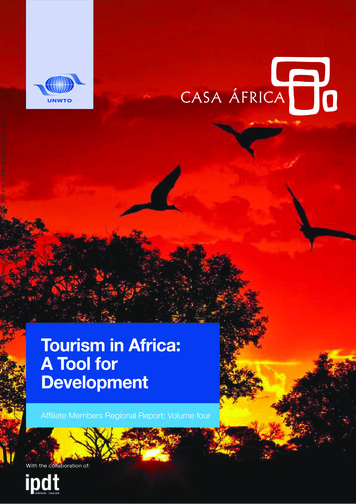
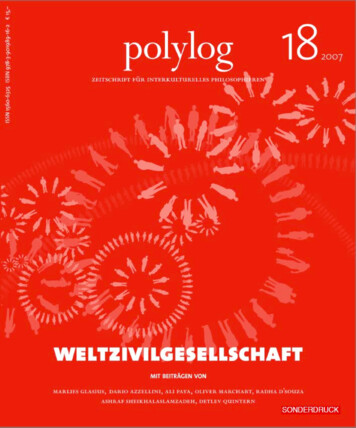

![Moran Conference Presentations June 2016 [website version]](/img/55/moran-conference-presentations-june-2016-website-version.jpg)
